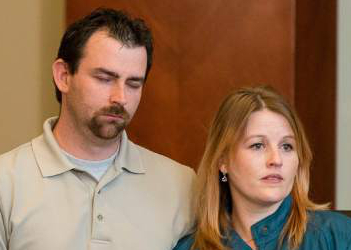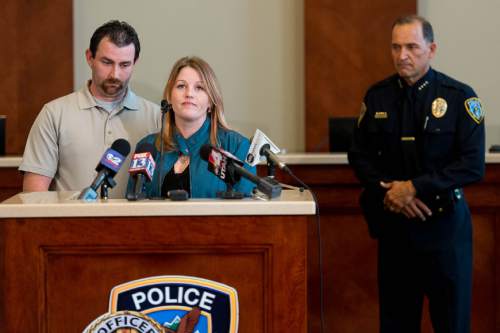This is an archived article that was published on sltrib.com in 2015, and information in the article may be outdated. It is provided only for personal research purposes and may not be reprinted.
A juvenile court judge said Monday he would rule later on whether a now-17-year-old boy should be treated as an adult or remain in the juvenile justice system to face charges in the brutal beating death of his 15-year-old girlfriend.
Third District Juvenile Court Judge Dane Nolan said he will issue a written ruling on the issue of which court will have jurisdiction over the teen in the 2012 death of Anne Kasprzak, whose body was discovered battered beyond recognition in the Jordan River in Draper shortly after her disappearance.
The teen, facing first-degree felony murder and second-degree felony obstruction of justice charges for events that took place when he was 14, arrived in the courtroom wearing a gray sweatshirt and jeans that appeared too large for his skinny frame. He spent the hearing with his head down, apparently taking notes.
The Salt Lake Tribune generally does not identify juvenile defendants unless they have been certified to stand trial as an adult.
Prosecutors asked that he be tried as an adult because of the nature of the crime.
"This was a brutal, aggressive and violent beating," Deputy Salt Lake County District Attorney Patricia Cassell said during closing arguments on Monday.
Cassell noted there were up to nine blows that caused fractures to Kasprzak's skull: "Basically her forehead was shattered."
The prosecutors also claimed the murder was premeditated, saying the defendant lured Kasprzak to an isolated spot near the Jordan River in Draper, killed her and dumped her into the river, then tried to cover up the crime.
Defense attorney Bill Russell argued that the case should be kept in juvenile court.
"There is no evidence of premeditation or willfulness," Russell said, pointing to testimony of his mother: "He's a mellow little guy, is what his mom has characterized him as."
Russell admitted the crime was brutal and that state law says that in making the decision the judge should consider the allegations as true, which he characterized as a flaw in Utah statutes.
Russell also reiterated the defense's position that the obstruction charge should be tried separately from the murder charge. But there would be no need for two trials, because the teen is ready to plead guilty to obstruction of justice if that count remains in juvenile court, Russell said.
The teen will get more services and have a greater chance of rehabilitation if he is left in juvenile system, as opposed to going to the state prison where he is more likely to face trauma and victimization, the attorney said.
If the case remains in juvenile court, the teen will be released from custody when he turns 21 — in just over three years.
In adult court, he would face a 15 years to life sentence.
Last Thursday, the defendant's father testified that his son was a "typical 14-year-old boy" at the time of the homicide.
The victim's mother, Veronica Kasprzak-Bratcher, has said their family hopes he stands trial in adult court.
"He made a pretty adult decision," she said. "This wasn't a one-time, accidental 'I lost my temper.' This was brutal. And that's a pretty adult decision to make."
During the preliminary hearing last week, prosecutors put on evidence that the defendant and the victim had called each other 10 times March 10, 2012, the night Kasprzak went missing from her Riverton home.
A cellphone expert testified Wednesday that they were able to pinpoint where the defendant was when Kasprzak's mother called him at 9:01 that night.
He was near a pedestrian bridge west of 12600 South along the Jordan River Parkway in Draper, testified Sy Ray, who is the president of a company that specializes in police cellphone investigations.
That's the same bridge — upstream from where the girl's beaten body was later pulled from the river — where drops of Kasprzak's blood were found the next day.
Kasprzak had been telling friends and family she was pregnant with the boy's baby, but her stepfather testified Monday that she wasn't pregnant.
The obstruction of justice count stems from the defendant's attempts to get a friend to lie to police about how Kasprzak's blood got on the defendant's shoes.
The defendant was arrested and charged in October 2014, at which time he was living in Colorado.





